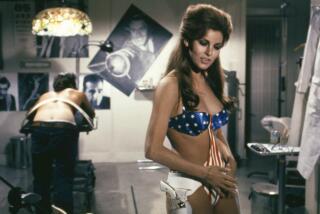Weighing Anchor, Welch Is a Master : L.A. Marathon: Former petty officer began running at 35 and became one of the world’s best.
- Share via
Sometimes Priscilla Welch dreams she is wearing her Royal Navy uniform, but she’s missing her hat or gloves. In her dream she is frantic to find the correct uniform part, lest she be reprimanded by a superior officer.
Her husband, David, doesn’t have the dreams. But sometimes he gets up in the morning and goes to the closet to put on his warrant officer’s uniform.
The Welches are former military--he was in for 22 years, she was in for 12--and there are military drills that became habits in their lives. Both have been watching the Gulf War with the keen interest of professionals assessing other professionals.
It’s difficult to reconcile the Priscilla Welch that was a petty officer--a cigarette-smoking, overweight, pub-crawling party girl--with the Priscilla Welch who, at 46, is the world’s preeminent women’s masters runner, a slight, seed-eating teetotaler.
Welch, who will run in today’s Los Angeles Marathon, was restless and unhappy in a career in the navy and was posted in Norway when, at 35, she found running, love--and, along the way, the Olympics and herself.
At 16, she ran away from home, which was a village north of London. She doesn’t remember being rebellious in any dramatic way, largely because her remote town didn’t offer elaborate vices.
“The teen-agers in our village formed this club--well, it all seems very tame now,” Welch said. “It met down the road in somebody’s cellar. Someone brought an old record player, somebody else brought some beer. We had kissing games and stuff like that, nothing compared to what kids do today. Anyway, my parents banned me from going down there because they didn’t want me to associate with the people who went there. Well, I went, came home, got the biggest hiding of my life, no meal, went straight to bed.”
Welch ran away to stay with a favorite aunt and uncle, who regaled her with colorful stories of life in the wartime navy. The excitement and the camaraderie seemed just the romantic escape that the troubled teen-ager sought. Welch signed up at 17.
Her first overseas posting was to Malta in the Mediterranean Sea. She was 18, the place was crawling with British and American sailors, there was sun and water. This was not a job, this was an adventure.
Welch and her roommates enjoyed going to the balcony of their barracks and flashing messages to American ships in the harbor. Of course, no one knew Morse code.
“That used to get them going,” she said, laughing. “They’d flash their lights at us and they’d flash their semaphore flags. We hadn’t a clue what they were talking about.
“But we all had a ball, especially when the American servicemen came in off the ships. They used to come in on their mine sweepers right up to the beach, the mine sweepers had such a flat bottom. Their mine sweepers were like our frigates. All their ships were huge compared to our ships. They used to spoil us rotten. They had a lot of food and drink. We went out in their dinghies. They knew how to enjoy themselves and have fun. Randy little devils.”
Welch was in communications and enjoyed the early, pre-computer days. Part of her job was to decode messages and attempt to break enemy codes.
“I liked cracking codes that wouldn’t break,” she said. “I can look at a car number plate and it can trigger off memories, with the figures and numbers.”
Life in the navy had its security, but Welch found she was less satisfied as time went on. During a posting at the British Admiralty in London, she worked a night shift and began to sleepwalk. She would get up, place a pencil behind her ear and, her roommates told her, begin to speak to them as if on a military radio.
The night shifts also relegated the hope of uninterrupted sleep into the “fat chance” category. Welch frequently clashed with the little old lady who policed the barracks during the early morning fire drills:
“I usually had just gotten to sleep then there was a ‘Brring, Brring, Brring,’ the fire practice bell. I used to lie there, saying, ‘To hell with this, my sleep’s more important.’
“Then the ma’am in charge would come in. She’d point at me and say, ‘Well, dear, you’ve just been incinerated.’ I just wanted my sleep.”
After six years Welch decided to quit the navy. She got a job working for a police department regional crime squad, but she was still in the naval reserves. For four years Welch lived in a one-room apartment and had no social life to speak of. She pondered the specter of living in the same rut the rest of her life.
Welch made a decision that, unlikely as it seemed, would change her life: she rejoined the navy. The transformation came in 1977 when she was shipped to Norway. There, she noticed that everyone seemed to spending their spare time as she did, in bars and discos. Welch wanted more, but wasn’t sure what.
“I was getting frustrated with the military,” she said. “I didn’t have much off-duty time. I was mama-san to eight British navy girls. I had to make sure they went to work and behaved themselves and held the flag high. I rebeled against that. I used to go out for long walks. I felt a wee bit suffocated.”
Welch remembers on her walks seeing a British naval officer running, always running. What a curious thing, she thought.
Then she met the officer--typically, in a bar. David Welch invited Priscilla to join the Norwegian running club to which he belonged. David, with a boxer’s nose and wiry athlete’s body, had an infectious attitude about sports. “You name the sport, I’ll show you the bone I broke playing it,” he says.
After 35 years of athletic lethargy, Priscilla began jogging with a group of Norwegian women. She and David went to night classes to learn the language. She quit smoking and became no more than a social drinker.
So filled was her new life that she decided to quit the navy. Priscilla and David Welch, who remained in the service, moved in together. Priscilla took a job cleaning houses and continued to run.
In 1979, they went to Stockholm, where David was to run his first marathon. On a lark, Priscilla--who had never run more than 25 miles in a week --jumped into the race. To her astonishment, she finished ninth among the women in 3 hours 26 minutes.
Later that night, in the tent where the couple had camped to save the cost of a hotel room, Priscilla turned to David and announced, “I’m going to make it my goal in running to take an hour off that time.”
Eight years later at the London Marathon, setting a British record of 2:26:51, she achieved her goal. In 1984, at 40, Welch confounded the running establishment by making the British Olympic team and placing sixth at the L.A. Olympics.
No one is more flabbergasted at her belated success than Welch herself. Few enjoy it as much. She says that’s a function of experience and age. She has been without and prefers being with.
Welch, a relentless talker, an energetic companion and tenacious competitor, is also a much sought-after corporate billboard. There are 12 people from the Washington State Potato Board who are in town this week because Welch is representing the group, whose product is the “official carbohydrate of L.A. Marathon.”
Of course, there are many who find Welch’s success at her age an affront, some kind of adult rebellion. Some in the British athletic establishment--as ticklish a political group as may be found anywhere--are still referring to Welch as a one-shot runner, an over-the-hill freak who will soon be surpassed by an apple-cheeked young British phenom who doesn’t yet exist.
Welch has one more military maneuver for the doubters. Despite enduring the first serious injury of her career for the past two years--stress fractures in her feet that are now healed--Welch has a plan: to qualify for and run in the 1992 Olympics at Barcelona. At age 47.
More to Read
Go beyond the scoreboard
Get the latest on L.A.'s teams in the daily Sports Report newsletter.
You may occasionally receive promotional content from the Los Angeles Times.











